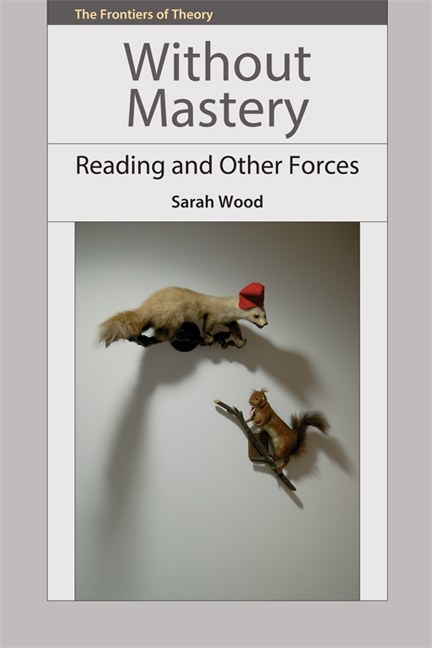Book contents
- Frontmatter
- Contents
- Series Editor's Preface
- Acknowledgements
- Epigraph
- Through the Reader
- Inventing the Reader
- Try Thinking As If Perhaps
- A Mere Instinctive Deconstruction
- Close to the Earth
- Beyond Me Nowhere But This Earth
- Edit
- Reading Matters
- Some Thing, Some One, Some Ghost (About the Fires of Writing)
- Nightshift
- Too Late To Begin?
- Notes
- Index
Beyond Me Nowhere But This Earth
Published online by Cambridge University Press: 05 August 2016
- Frontmatter
- Contents
- Series Editor's Preface
- Acknowledgements
- Epigraph
- Through the Reader
- Inventing the Reader
- Try Thinking As If Perhaps
- A Mere Instinctive Deconstruction
- Close to the Earth
- Beyond Me Nowhere But This Earth
- Edit
- Reading Matters
- Some Thing, Some One, Some Ghost (About the Fires of Writing)
- Nightshift
- Too Late To Begin?
- Notes
- Index
Summary
Of what secret lights are we made? Of what densities?
(Hélène Cixous, ‘Bathsheba, or the Interior Bible’)We are all private people. We're all on our own. When people say, ‘Oh someone has seen something that wasn't there’, it's absolutely true. It can't get more pure than that. The atmosphere I want to get across is hope.
(Nicholas Roeg)We have been getting into the pre-verbal aspect of writing, the part before words, and therefore before ‘theory’ gets established. An interest in spells, chants, liturgies, girls, boys and animals playing and living on the earth of letters (shards of ruin, rubble and ash, an unapproachable but active materiality) follows on more-or-less spontaneously from there. This chapter was written under the hypnotic spell of a film about children and childhood. It cuts away from literature and the literary, not entirely freeing itself from certain delicate critical negotiations with language. Derrida insists that ‘deconstruction started with suspecting the authority of language, of verbal language and even language in general, and human language in particular’ (‘Bâtons rompus’, p. 210). In this way, he insists, deconstruction is ‘childlike and animal-like’. Cixous responds that the child ‘is a dreamer’, and that for an adult it is ‘only in the lifting of prohibition in the state of dreaming’ that one ‘can reach the point of affect where one is oneself witness and proof that extreme pain, the extremity of pain and the pain of pain, and the secret of pain, is a pleasure [jouissance]’ (‘Bâtons rompus’, p. 211). Dreaming is a far point of experience, as is writing. Freud's understanding of regression in dreams casts its light on the filmy shapes of animal-letters and sounds that are the relics of the prehistory of reading, still left in reading. There is still the problem of writing-about-a-film. There is still a language of film. But that is not what matters most. Have you seen Dark Glass? If I could say what it is, it would not be what it is; the sheer surprise, perhaps, of seeing and hearing what happens. The director Clio Barnard says: ‘If you really pay attention to the way people speak, it becomes amazing.’
Clio Barnard's films reflect on voices and speech, as well as on sight, world, memory and words.
- Type
- Chapter
- Information
- Without MasteryReading and Other Forces, pp. 66 - 74Publisher: Edinburgh University PressPrint publication year: 2014



